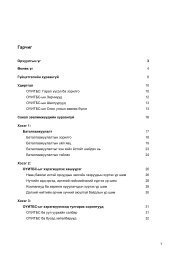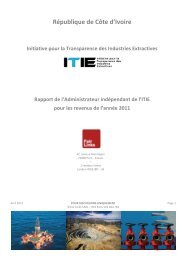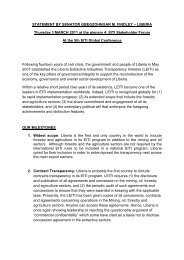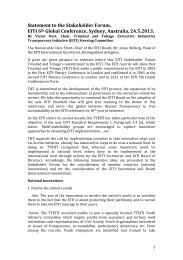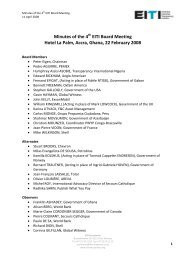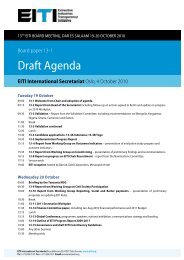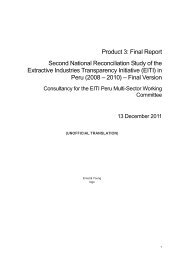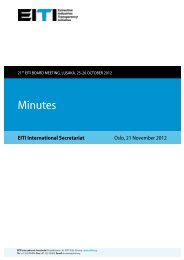Vietnam feasibility study - EITI
Vietnam feasibility study - EITI
Vietnam feasibility study - EITI
Create successful ePaper yourself
Turn your PDF publications into a flip-book with our unique Google optimized e-Paper software.
• Governments should assign the responsibility of conducting research and approach <strong>EITI</strong> to a<br />
central government agency level. At the same time, it should appoint the person in charge of<br />
implementing the <strong>EITI</strong> to build the program and the overall plan. Normally, the person to be<br />
appointed must be senior officials of government at the ministerial level, who have experience<br />
in revenue management and influence in coordinating activities between departments of<br />
government. Almost all of the respondents claimed that either the ministry of Finance or<br />
the ministry of Industry and trade should be the agency responsible for implementing <strong>EITI</strong><br />
in <strong>Vietnam</strong>. In addition, the Ministry of Natural Resources and Environment and the National<br />
Standing Committee on Anti-corruption should be highly involved.<br />
• Build and announce the implementation plan: the plan must specify measurable targets and<br />
specific actions to achieve the target and responsibilities of stakeholders and time frame, the<br />
cost and resources for implementing <strong>EITI</strong> program.<br />
During this period, individuals and agencies who are appointed by the Government can access the<br />
World Bank and some sponsors to call for both financial and technical support through the Multidonor<br />
Trust Fund under the World Bank’s management and coordination.<br />
step 2: mobilizing parties to participate in eItI<br />
Implementation principles of <strong>EITI</strong> are the approach with the participation of different stakeholder<br />
groups. This means that stakeholders, especially civil social organizations and extractive companies,<br />
are involved not only by comments but also directly involved in the construction and management<br />
activities in the implementation process.<br />
Depending on the context in each country, the number and level of stakeholders to participate in the<br />
<strong>EITI</strong> program is different. Identifying the specific components involved in the <strong>EITI</strong> Committee is rather<br />
complicated. Here are some considerations related to national <strong>EITI</strong> committee and the way to manage<br />
this committee:<br />
• The legal foundation for the establishment of the National <strong>EITI</strong> Committee: In some countries, the<br />
group of stakeholders was established through a number of legal documents such as decisions<br />
by the heads of government. In the context of <strong>Vietnam</strong>, the decision of the Prime Minister would<br />
be suitable.<br />
• Determine the number and nature of committee members: According to the regulation of the<br />
<strong>EITI</strong>, the member participating in the <strong>EITI</strong> Committee must have both representatives from state<br />
agencies, enterprises and civil society. In fact, the number of committee members as well as the<br />
percentage of each object depends on the specific conditions of each country. Usually the <strong>EITI</strong><br />
Committee in each country consists of 10-20 members. It should be noted that the presence<br />
of enterprises and organizations of civil society in the <strong>EITI</strong> committee is essential to ensure the<br />
representation and tolerance in the <strong>EITI</strong> Commission’s decision.<br />
• Assign and review committee members: Committee members of the <strong>EITI</strong> board are generally<br />
from 1-2 years. The selection of new members may be by: (i) appointed by the government,<br />
(ii) holding a meeting to choose members, (iii) by the different target groups involved or (iv)<br />
publish widely the requested credentials of the candidate.<br />
• The role of the <strong>EITI</strong> Chairman: Most of the <strong>EITI</strong> National Committee has commissioned an individual<br />
to be responsible for coordinating and managing the meetings and who are often appointed by<br />
the government.<br />
• Voting and making other decisions: When the <strong>EITI</strong> Committee was established, the members<br />
of the committee agreed to the terms and procedures that the Committee will operate. The<br />
terms and procedures, including voting, and the numbers of delegates are necessary for<br />
decision making.<br />
The Extractive Industries Transparency Initiative and the Implementation Perspective of <strong>Vietnam</strong><br />
61



